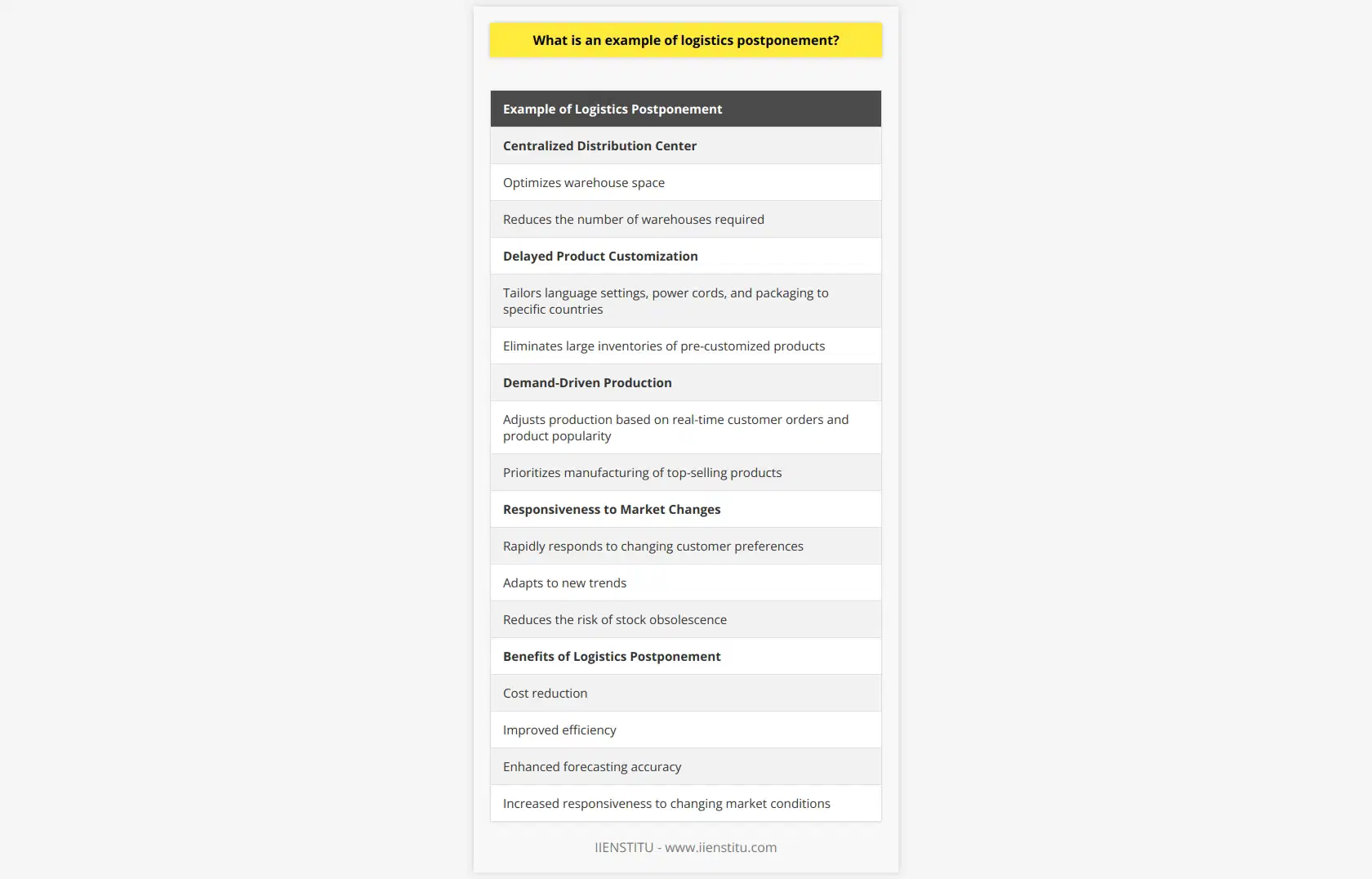
This article discusses the process of order postponement when an entire order or part of it is postponed or executed in parts. It explains the reasons for order postponement, such as customer demand changes or supply chain disruptions, as well as the challenges associated with it, such as difficulty coordinating the process, delays, and increased costs. Logistics professionals must know the potential challenges of order postponement and how to manage them.
Introduction
Definition of Order Postponement
Reasons for Order Postponement
Challenges Associated with Order Postponement
Conclusion
Introduction: Customer service is an essential part of the logistics supply chain. It involves a range of tasks that must be coordinated to ensure the delivery of products and services to the customer in a timely and efficient manner. In some cases, customers may require that an entire order or a part thereof be postponed or executed in parts in a phased manner. This process is known as order postponement and can be challenging for the logistics supply chain. In this article, we will define order postponement, discuss the reasons for it, and identify its challenges.
Definition of Order Postponement
Order postponement is a process in which an entire order or a part thereof is postponed or executed in parts in a phased manner. This may be due to the rescheduling of requirements at the customer’s end or the availability of a specific product category in the future. The seller may ask the buyer to place the order and ship the product when it is available on future dates.
Reasons for Order Postponement
Network Design Optimization İn Supply Chain İmpact Assessment
Efficient Supply Chain Management And Collaboration With Vendors
Order postponement is often used when customers need to reschedule their orders due to changes in their needs. For example, a customer may need to postpone an order if their demand for a product changes or their supply chain is disrupted. In addition, order postponement can be used when a product is unavailable at the time of the order. In this case, the seller may ask the buyer to place the order and ship the product when it is available on future dates.
Challenges Associated with Order Postponement
Order postponement can present several challenges for the logistics supply chain. First, it can be difficult to coordinate the order postponement process. This is because the seller and buyer must agree on the terms of the postponement and the timeline for delivery. In addition, order postponement can cause delays in the supply chain and lead to increased costs. Furthermore, order postponement can lead to inventory imbalances, as the seller may have to store the product until it is ready to be shipped.
Conclusion: Order postponement can be a valuable tool for customers who need to reschedule their orders due to changes in their needs or product availability. However, it can present several challenges for the logistics supply chain, including difficulty in coordinating the postponement process, delays in the supply chain, and increased costs. Logistics professionals must know the challenges associated with order postponement and how to manage them.
Delay is the enemy of efficiency in logistics management; order postponement challenges must be addressed quickly and effectively.
Related Course: Logistics Certification

Frequently Asked Questions
What is the definition of order postponement in logistics management?
Order postponement is a concept used in logistics management that involves delaying the start of production until the order is placed. This allows the presentation to be tailored to the specific customer's needs and can reduce the inventory a company needs to keep on hand.
Order postponement can be used in various areas, including manufacturing goods, customizing products and services, and managing inventory. By delaying the start of production until the order is placed, companies can reduce the amount of stock required to meet customer needs. This is especially true for companies that produce goods in small batches or make custom products.
Order postponement also allows companies to reduce their operational costs by reducing the time spent on production. By delaying the start of production until after an order is placed, companies can reduce the amount of time spent on production and associated costs such as labor, materials, and energy.
Order postponement also allows companies to manage their supply chains better. By delaying the start of production until after an order is placed, companies can better manage their production schedules and ensure that they have the necessary materials and resources to meet customer demands. This helps companies to reduce lead times and keep their supply chains running efficiently.
In conclusion, order postponement is an essential concept in logistics management. It allows companies to reduce operational costs, better manage their supply chains, and reduce the amount of inventory needed to meet customer needs. By delaying the start of production until after an order is placed, companies can reduce their operational costs and ensure that they have the necessary materials and resources to meet customer demands.
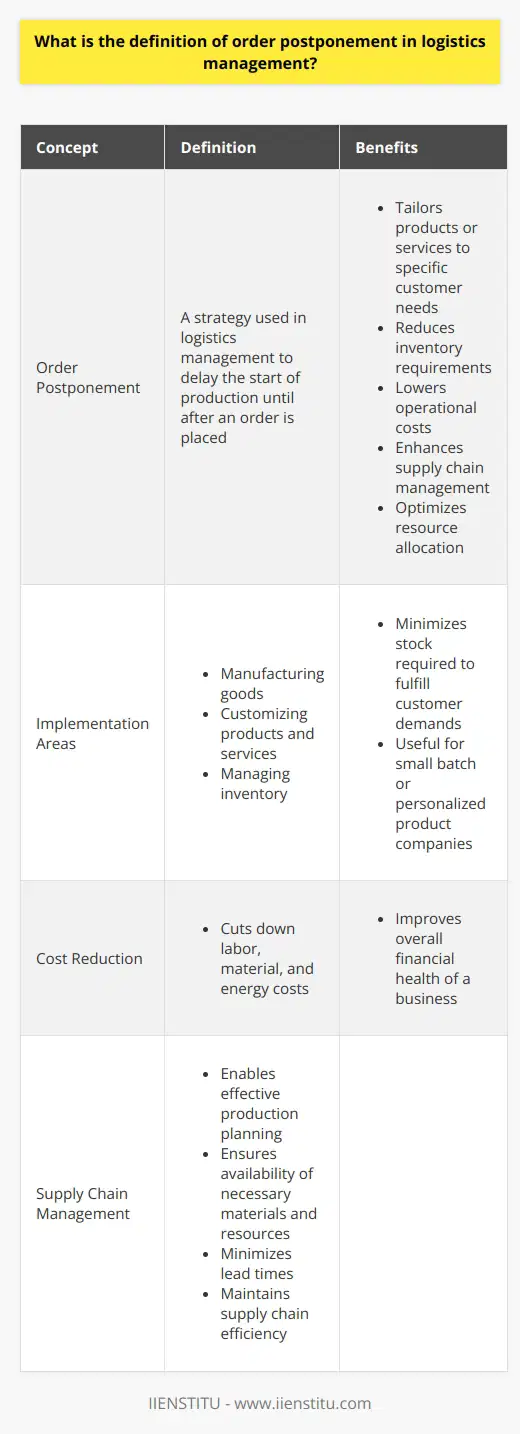
What are the reasons for order postponement in logistics management?
Order postponement in logistics management can significantly impact the supply chain's efficiency and cost. By postponing an order, companies can reduce the amount of inventory they need to store and the amount of time it takes to produce and deliver the goods. However, there are several reasons why an order may need to be postponed.
One of the most common reasons for order postponement is a lack of available inventory. If a company does not have the necessary components or materials in stock, it will need to postpone the order until it can acquire the necessary resources. This could be due to a sudden demand increase or a supply chain disruption.
Delays in the production process can also lead to order postponement. If a company needs to wait for parts to be manufactured or delivered, they may need to postpone the order until they can complete the production process. Additionally, if the production process is complex and requires a significant amount of time, the company may need to postpone the order until the process is complete.
In addition, external factors can affect the ability of a company to deliver orders on time. For example, if there are delays in the transportation of goods, the company may need to postpone the order until the goods can be delivered. Additionally, if there is a disruption in the global supply chain, the company may need to defer the order until the supply chain is restored.
Finally, weather conditions can also lead to order postponement. If there is a severe storm, the company may need to postpone the order until the roads are cleared, and the weather conditions improve. Additionally, suppose there are delays due to unforeseen circumstances, such as an accident or a natural disaster. In that case, the company may need to postpone the order until the situation can be resolved.
In conclusion, order postponement can significantly impact the supply chain's efficiency and cost. The reasons for order postponement can vary, but they often include a lack of available inventory, delays in the production process, external factors, and weather conditions. By understanding and anticipating the potential causes of order postponement, companies can take steps to minimize disruptions and delays in the supply chain.
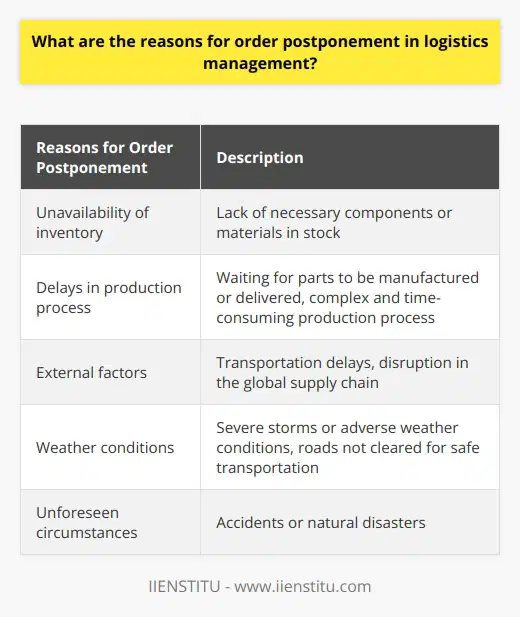
What are the challenges associated with order postponement in logistics management?
Logistics management involves efficiently moving goods from the point of origin to the point of consumption to meet customer requirements. One of the primary goals of logistics management is to minimize the time and cost associated with the transportation and delivery of goods. However, order postponement is a common challenge in logistics management, as it can lead to delays in the delivery of goods and increased costs.
Order postponement delays the transportation of goods until customer demand has been established. Postponement can take many forms, including delaying the shipment of goods, postponing the production of goods until customer demand has been set, and postponing the assembly of goods until customer demand has been established. This practice can reduce the risk of delivering excess inventory, as well as inventory obsolescence.
Despite the potential benefits of order postponement, there are several challenges associated with its implementation. First, order postponement requires detailed information about customer demand to adjust production and delivery schedules effectively. Without this information, companies run the risk of producing too much or too little inventory, which can lead to increased costs and customer dissatisfaction.
Second, order postponement can lead to delays in the delivery of goods. This is because the production, transportation, and assembly of goods must be adjusted to meet customer demand. As a result, companies must plan for additional lead times when implementing order postponement.
Third, order postponement can be challenging to manage in complex supply chains. This is because each stage of the supply chain must be synchronized to meet customer demand. For example, if production is delayed due to a lack of materials, it can lead to delays in the delivery of goods.
Finally, order postponement can require significant investments in technology, such as enterprise resource planning (ERP) systems, to effectively manage customer demand and adjust production and delivery schedules accordingly.
In conclusion, order postponement can be a helpful tool in logistics management, but it is not without its challenges. Companies must be prepared to invest in technology, manage complex supply chains, and effectively plan for additional lead times to implement order postponement.
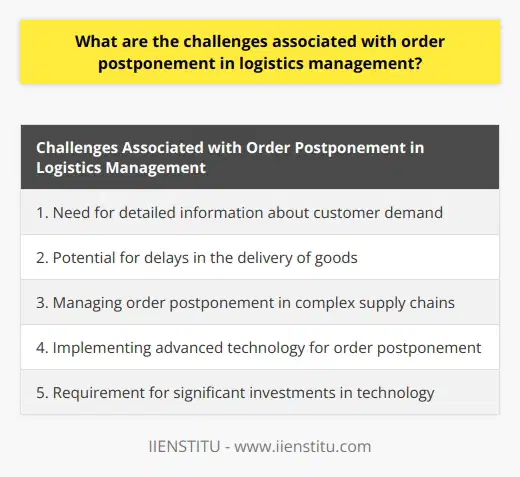
What are the primary factors influencing the success of logistics postponement?
Logistics Postponement: Primary Factors Influencing Success
Product Characteristics
One key factor influencing the success of logistics postponement is the nature of the product. Products with a high degree of personalization, customization, or a wide range of variations and options are particularly suitable for postponement strategies. This is because the differentiation process can be delayed until the specific customer requirements are known, potentially reducing excess inventory levels and facilitating better demand forecasting.
Market Demand Variability
Another vital determinant in the effectiveness of logistics postponement is the variability of market demand. Industries facing significant fluctuations in demands, such as seasonal products or products with short life cycles, can benefit substantially from postponement strategies. By delaying the finalization of the product until the actual demand is known, firms can minimize the risk of overproduction and obsolescence, thus improving the overall supply chain efficiency.
Supply Chain Capabilities
Strong supply chain capabilities are essential for the successful implementation of logistics postponement. These capabilities include robust IT systems, flexible manufacturing processes, skilled workforce, and agile distribution networks. Companies must be able to quickly and efficiently reconfigure their supply chain operations in response to changing customer demands to capitalize on the advantages of postponement.
Collaboration Among Stakeholders
Effective communication and collaboration among supply chain stakeholders, such as suppliers, manufacturers, and distributors, are crucial for implementing logistics postponement strategies. Sharing accurate and timely information throughout the supply chain enables businesses to make better-informed decisions regarding production schedules, inventory levels, and distribution plans. This collaboration allows companies to respond more effectively to market demands, ultimately leading to the success of postponement strategies.
Cost Management
Lastly, a crucial factor in the success of logistics postponement is the ability to manage costs effectively. While postponement can lead to significant cost savings, such as reduced inventory carrying costs, there may be additional costs associated with implementing postponement strategies, such as increased transportation and warehousing expenses. Companies must balance these costs with the benefits gained from postponement to ensure a successful outcome.
In summary, the success of logistics postponement hinges upon product characteristics, market demand variability, supply chain capabilities, collaboration among stakeholders, and effective cost management. Companies considering these factors when implementing postponement strategies can optimize their supply chain performance and enhance their competitiveness in the market.
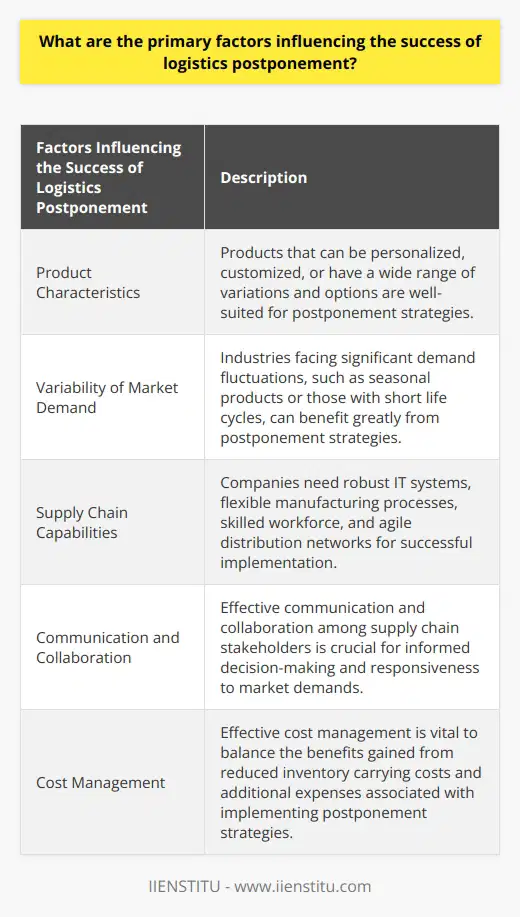
How does the principle of postponement in logistics impact supply chain efficiency and responsiveness?
The Concept of Postponement
The principle of postponement in logistics significantly impacts supply chain efficiency and responsiveness by allowing organizations to delay certain processes until customer demand is better understood. This approach gives companies greater flexibility to adapt their supply chains to meet fluctuating market requirements.
Effect on Supply Chain Efficiency
Postponement positively contributes to supply chain efficiency by reducing inventory levels and storage costs. By postponing specific processes and decisions until demand is clearly defined, organizations can optimize the use of their resources and avoid investing in the production or distribution of unnecessary goods. Consequently, this strategy minimizes the risk of overstocking and product obsolescence, thus generating cost savings and improving overall supply chain performance.
Influence on Responsiveness
In addition to enhancing efficiency, the principle of postponement also increases supply chain responsiveness by enabling companies to react quickly to changing customer needs. By deferring product differentiation and last-mile customization until the last possible moment, organizations can swiftly adapt to shifts in consumer preferences and deliver tailor-made products to individual markets. This heightened responsiveness allows companies to stay agile and competitive in dynamic business environments.
Role in Risk Reduction
Another key benefit of embracing the concept of postponement is the reduction of supply chain risks. By providing a buffer against uncertainties in both demand and supply, postponement strategies allow organizations to better manage unexpected events, such as natural disasters or political disruptions. This increased risk mitigation strengthens the overall resilience and reliability of the supply chain.
Implementation Challenges
Despite its numerous advantages, implementing postponement can pose various challenges for companies. Some potential barriers to adoption include the need for sophisticated information systems, increased coordination between supply chain partners, and higher operational complexity. Consequently, it is essential for organizations to carefully evaluate the feasibility and appropriateness of postponement in their specific context to ensure successful integration and reap the benefits of this principle.
In conclusion, the principle of postponement in logistics plays a critical role in enhancing supply chain efficiency and responsiveness by allowing organizations to better align their production and distribution activities with actual customer demand. By minimizing inventory costs, improving risk management, and increasing agility, the postponement strategy can lead to significant competitive advantages for companies operating in volatile markets.
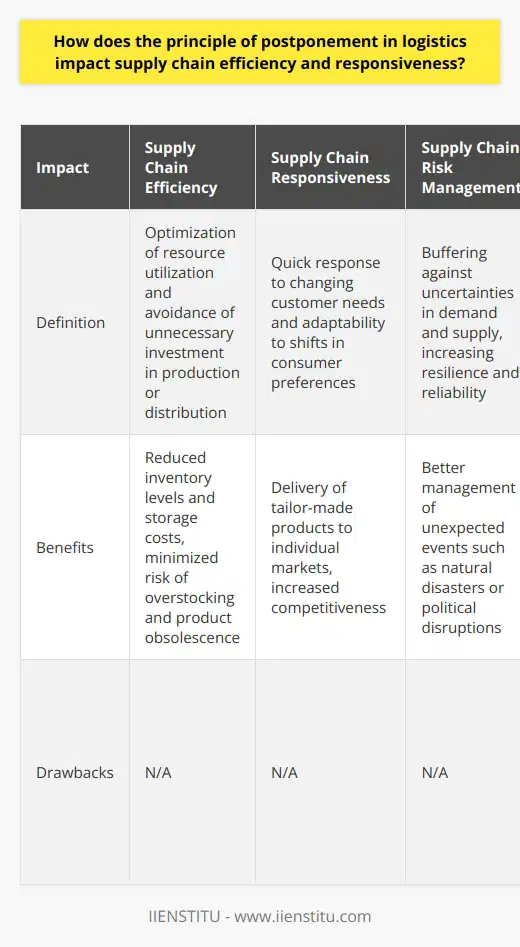
Can you provide practical examples of companies successfully utilizing postponement strategies in their logistics operations?
**Postponement in Logistics Operations**
Postponement strategies involve delaying specific activities in the supply chain until the actual demand for those products is known. By implementing postponement strategies, companies can reduce inventory carrying costs, improve customer service levels, and respond more quickly to fluctuations in demand.
**Examples of Successful Postponement**
*Dell Computers: Customization Postponement*
One of the most well-known examples of a company using postponement effectively is Dell Computers. Dell's build-to-order model allows customers to customize computers according to their specific needs. By postponing the assembly of the components until an order is placed, Dell reduces its inventory carrying costs and offers greater product variety while providing quick delivery.
*Zara: Time Postponement*
The fast-fashion retailer Zara, part of the Inditex Group, utilizes time postponement in its logistics operations. Zara produces small batches of new designs, postponing large-scale production until it can gauge consumer demand. This allows them to respond swiftly to market trends and minimize excess inventory, resulting in lower costs and a more efficient supply chain.
*Philips: Form Postponement*
Dutch company Philips is an example of a company using form postponement in its logistics operations. Philips practices partial manufacturing of their electronic products, postponing the final assembly of components such as country-specific plugs and voltage adaptations. By delaying these specific actions, Philips can cater to different markets with minimal inventory and quicker order fulfillment.
*BMW: Geographic Postponement*
BMW has utilized geographic postponement for its vehicle export business. The automaker produces and stores vehicles at its factories but awaits the final assembly of components specific to the destination country. This postponement enables BMW to reduce costs associated with maintaining inventory for various markets and respond more rapidly to changes in demand.
**Benefits of Postponement Strategies**
In summary, these examples illustrate the potential benefits of successfully incorporating postponement strategies into a company's logistics operations. By delaying certain supply chain activities until demand becomes more predictable, firms can reduce inventory carrying costs, improve customer service levels, and respond to market fluctuations with greater flexibility. Implementing postponement strategies could be considered an essential tool for firms aiming for a more efficient and agile supply chain.
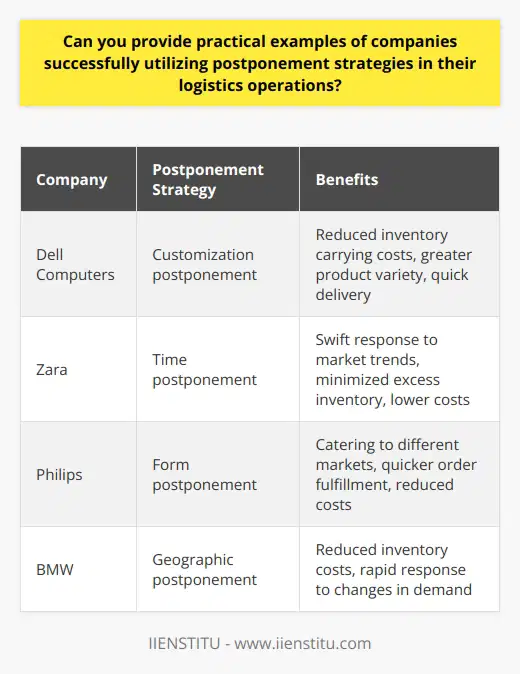
What is the principle of postponement in logistics?
Principle of Postponement: Definition and Overview
The principle of postponement in logistics refers to the strategic approach of delaying certain supply chain activities or processes until actual customer demand is known. The main goal of this technique is to minimize the costs and risks associated with holding excess inventory, obsolescence, and demand variability. By implementing postponement tactics within the supply chain, organizations are able to maintain a higher level of flexibility to adjust to fluctuating market conditions and customer requirements.
Advantages of Postponement in Logistics
There are several advantages that organizations can enjoy when they adopt the principle of postponement. Some of the most significant benefits include:
Reduced Inventory Costs: By delaying the assembly or production of final products until actual customer demand is confirmed, companies can reduce the amount of finished goods inventory they hold. This significantly reduces the cost of storing and managing excess inventory.
Enhanced Responsiveness: Postponement allows organizations to respond to fluctuations in demand more effectively, as they are better positioned to adjust their production and distribution plans in line with market needs. This agility helps reduce stockouts, overstocks, and the risk of obsolescence.
Minimized Forecasting Errors: Given the inherently uncertain nature of demand forecasting, relying too heavily on projections can lead to inefficiencies and costly errors. By adopting postponement strategies, organizations minimize their exposure to such inaccuracies.
Examples of Postponement Implementation
There are several ways in which organizations can apply the principle of postponement to their supply chain operations. Some examples include:
Product Customization: Instead of manufacturing fully finished products, companies can produce semi-finished goods that can be customized later based on the specific requirements of individual customers. This allows companies to delay the final production stages until demand has been confirmed.
Packaging and Labeling: Organizations can also apply postponement strategies to their packaging and labeling processes. By delaying these tasks, companies can avoid the need to hold inventory for each unique variation of a product, reducing overall inventory levels.
Location-based Postponement: In this approach, companies delay the transportation of goods to their final destination until an actual customer order is received. This approach enables organizations to optimize their distribution strategies in response to shifting customer demand patterns.
In conclusion, the principle of postponement offers a powerful strategy for organizations looking to improve their supply chain efficiency and responsiveness. By delaying specific activities or processes until customer demand is known, companies can reduce costs, minimize risks, and better adapt to fluctuations in market conditions.
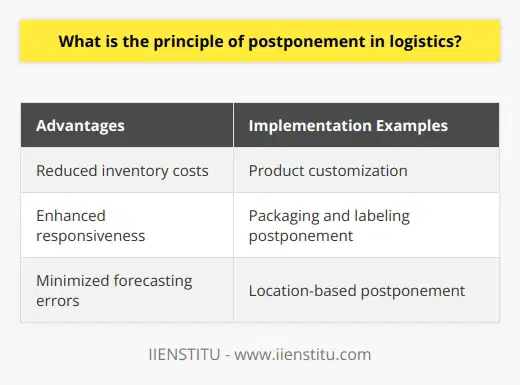
What are postponement characteristics in logistics?
Postponement Strategy in Logistics
Postponement characteristics in logistics refer to strategies employed by supply chain managers to delay certain activities or processes until customer demand has been identified. This approach allows businesses to reduce the risk of overproduction, save on inventory carrying costs, and respond to volatile market demands swiftly. In other words, the postponement strategy attempts to create a more agile and responsive supply chain by balancing efficiency and responsiveness.
Types of Postponement
There are several types of postponement strategies that can be adopted to cater to the needs of a specific supply chain. Each type is designed to address specific challenges and bring unique benefits to the supply chain.
Form Postponement: This strategy involves delaying the final assembly or manufacturing of a product until customer orders are received. Form postponement allows businesses to manufacture products in a modular fashion and then customize them according to the specific needs of their customers.
Time Postponement: Time postponement refers to the delayed delivery of goods to their final destination. It allows supply chain managers to consolidate shipments and schedule deliveries more accurately according to customer demand, reducing unnecessary transportation costs.
Place Postponement: Place postponement is the practice of holding inventory at centralized warehouses or distribution centers until customer orders have been identified. This enables businesses to minimize inventory carrying costs while maintaining a fast turnaround time for order fulfillment.
Label Postponement: Label postponement involves delaying labeling or branding of products until customer orders are received. It enables companies to maintain unbranded, semi-finished goods that can be quickly customized for different market segments or customers upon receipt of an order.
Benefits of Postponement
Implementing postponement strategies brings significant advantages to supply chain management. The primary benefits include cost reduction, increased flexibility, and improved customer service. By delaying certain activities or processes until customer demand is known, businesses can decrease inventory holding costs, reduce waste from overproduction, and quickly adapt to changing market conditions. Additionally, postponement strategies contribute to higher customer satisfaction by enabling businesses to deliver customized products more efficiently.
Challenges and Considerations
While postponement strategies can lead to substantial improvements in supply chain management, they also present challenges that must be considered. For example, companies must carefully analyze their product portfolio, customer preferences, and market dynamics to determine the most appropriate postponement approach. Also, implementing postponement strategies may require substantial investments in areas such as warehouse management, production processes, and transportation networks. Therefore, businesses should thoroughly assess the benefits and drawbacks of postponement to ensure its successful implementation.
In conclusion, postponement characteristics in logistics play a crucial role in enhancing supply chain performance by enabling companies to respond to fluctuating market demands effectively. By adopting appropriate postponement strategies, businesses can minimize risks associated with overproduction, reduce costs, and improve customer satisfaction.
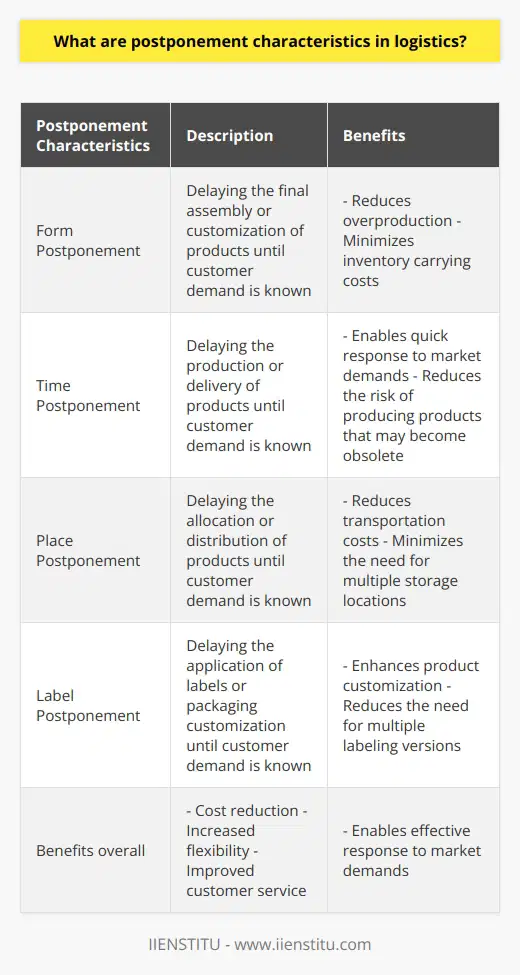
What is an example of logistics postponement?
Example of Logistics Postponement
Logistics postponement involves delaying specific logistics activities in the supply chain until there is a clear demand for the product. This strategy is primarily aimed at reducing costs, improving efficiency, and better aligning supply with demand. One example of logistics postponement is the European distribution center of a multinational consumer electronics company.
Centralized Distribution Center
The company centralizes its warehousing and distribution operations in a single European distribution center, optimizing warehouse space usage and reducing the number of warehouses required. This centralization allows the company to better manage inventory levels and minimize stockouts.
Delaying Product Customization
At the same time, the company delays final product customization until there is a confirmed customer order. For example, language settings, power cords, and packaging can be tailored to the specific country of the customer right before shipping. This approach reduces the need to keep large inventories of pre-customized products, leading to cost savings and less obsolete stock.
Demand-Driven Production
Logistics postponement also allows the company to adopt a demand-driven production model. By using real-time data on customer orders and product popularity, the company can adjust its production scheduling and prioritize the manufacturing of top-selling products. This process enhances the forecasting accuracy and reduces excess inventory.
Improved Responsiveness
Incorporating logistics postponement enhances the company's responsiveness to market changes and fluctuations in consumer tastes. By delaying logistics activities that don't add value until an order is received, the company can rapidly respond to changing customer preferences, adapt to new trends, and reduce the risk of stock obsolescence.
Conclusion
In summary, logistics postponement can bring significant benefits to companies, such as reducing costs, enhancing efficiency, improving forecasting accuracy, and increasing responsiveness to changing market conditions. The example of the multinational consumer electronics company demonstrates how centralizing distribution centers, delaying product customization, adopting a demand-driven production model, and improving responsiveness can enhance the overall performance of supply chain management.
